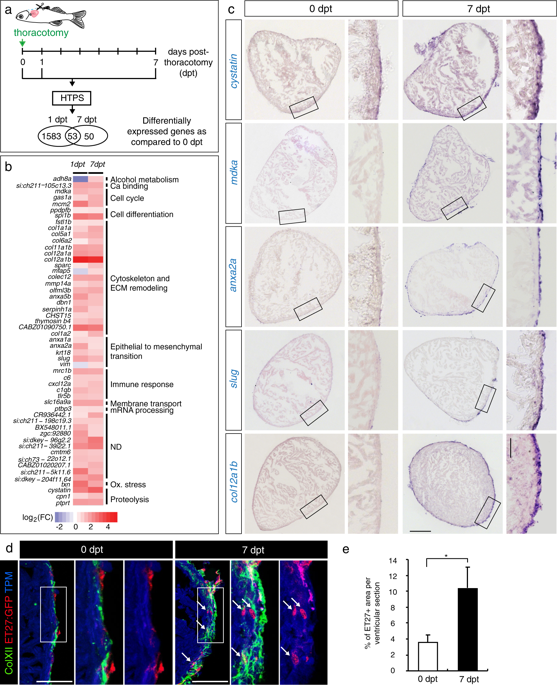npj Regenerative Medicine ( IF 6.4 ) Pub Date : 2019-01-24 , DOI: 10.1038/s41536-019-0064-9 Thomas Bise , Anne-Sophie de Preux Charles , Anna Jaźwińska

|
Unlike mammals, adult zebrafish can regenerate their hearts after injury via proliferation of cardiomyocytes. The cell-cycle entry of zebrafish cardiac cells can also be stimulated through preconditioning by thoracotomy, a chest incision without myocardial damage. To identify effector genes of heart preconditioning, we performed transcriptome analysis of ventricles from thoracotomized zebrafish. This intervention led to enrichment of cardioprotective factors, epithelial-to-mesenchymal transition genes, matrix proteins and components of LIFR/gp130 signaling. We identified that inhibition of the downstream signal transducer of the LIFR/gp130 pathway through treatment with Ruxolitinib, a specific JAK1/2 antagonist, suppressed the cellular effects of preconditioning. Activation of LIFR/gp130 signaling by a single injection of the ligand Cilliary Neurotrophic Factor, CNTF, was sufficient to trigger cardiomyocyte proliferation in the intact heart. In addition, CNTF induced other pro-regenerative processes, including expression of cardioprotective genes, activation of the epicardium, enhanced intramyocardial Collagen XII deposition and leucocyte recruitment. These effects were abrogated by the concomitant inhibition of the JAK/STAT activity. Mutation of the cntf gene suppressed the proliferative response of cardiomyocytes after thoracotomy. In the regenerating zebrafish heart, CNTF injection prior to ventricular cryoinjury improved the initiation of regeneration via reduced cell apoptosis and boosted cardiomyocyte proliferation. Our findings reveal the molecular effectors of preconditioning and demonstrate that exogenous CNTF exerts beneficial regenerative effects by rendering the heart more resilient to injury and efficient in activation of the proliferative programs.
中文翻译:

睫状神经营养因子刺激成年斑马鱼心脏的心脏保护和增殖活性
与哺乳动物不同,成年斑马鱼在受伤后可以通过心肌细胞的增殖来再生心脏。斑马鱼心脏细胞的细胞周期进入也可以通过开胸术(胸腔切开术,对心肌无损伤)进行预处理来刺激。为了鉴定心脏预处理的效应基因,我们进行了胸廓切开的斑马鱼心室的转录组分析。这种干预导致了心脏保护因子,上皮-间充质转化基因,基质蛋白和LIFR / gp130信号转导成分的富集。我们发现通过使用特异的JAK1 / 2拮抗剂Ruxolitinib来抑制LIFR / gp130途径的下游信号转导子,可以抑制预处理的细胞作用。通过单次注射配体睫状神经营养因子CNTF激活LIFR / gp130信号激活足以触发完整心脏中的心肌细胞增殖。此外,CNTF诱导了其他促再生过程,包括心脏保护性基因的表达,心外膜的激活,心肌内胶原XII沉积的增强和白细胞募集。同时抑制JAK / STAT活性可消除这些作用。突变 同时抑制JAK / STAT活性可消除这些作用。突变 同时抑制JAK / STAT活性可消除这些作用。突变cntf基因抑制了开胸术后心肌细胞的增殖反应。在再生斑马鱼心脏中,在心室冷冻损伤之前进行CNTF注射可通过减少细胞凋亡并增强心肌细胞增殖来改善再生的启动。我们的发现揭示了预处理的分子效应器,并证明了外源性CNTF通过使心脏对损伤更具弹性并有效激活增殖程序发挥了有益的再生作用。











































 京公网安备 11010802027423号
京公网安备 11010802027423号